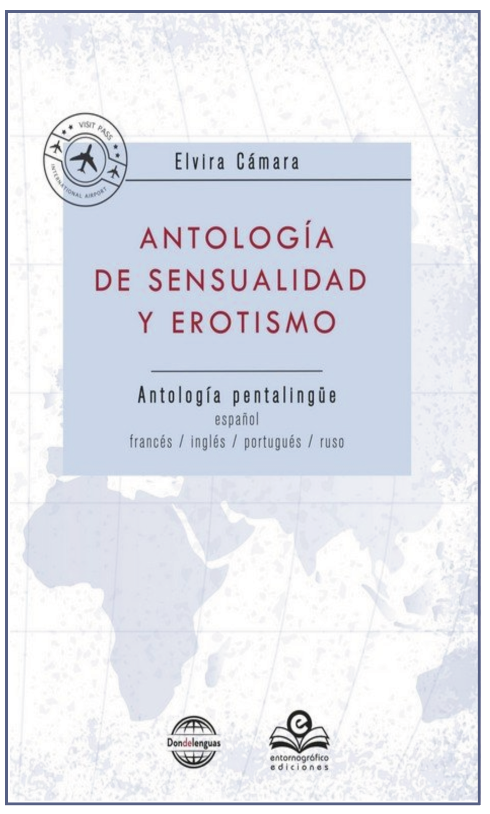
RESEÑA
Cámara Aguilera, Elvira (2021):
OF LOVE AND LUST (DE SENSUALIDAD Y EROTISMO)Aceptado: 1 de diciembre de 2021
Publicado: 27 de febrero de 2022

Cámara Aguilera, Elvira (2021):
OF LOVE AND LUST (DE SENSUALIDAD Y EROTISMO)
Elvira Cámara Aguilera (1968) is a Spanish writer with prolific production in the genre of short stories. She works as a Professor in the Faculty of Translation and Interpretation of the University of Granada (UGR). In this faculty, the 20th project TRAD-ELVIRA 2019-2020 emerged with the collaboration of the Bordeaux Montaigne University in France, the University of Geneva in Switzerland, the Federal University of Santa Maria in Brazil, the Federal University of Rio Grande do Sul in Brazil and the Moscow State Linguistic University in Russia. This innovation project gave birth to the collection of 14 short stories on the theme of love and eroticism, written originally in Spanish and translated collaboratively by four translation groups into English, French, Portuguese and Russian. It was designed to foster the abilities of the students to work in group and to enhance their linguistic and cultural capacities and at the same time access the editorial market through the published book.
Of Love and Lust is the English translation of De Sensualidad y Erotismo. It is comprised of a variety of evocative short and micro stories that portray love, desire, intimacy and eroticism. They tangle common and timeless problematics people usually face in their relationships, narrated from a female point of view. Elvira Cámara has a discreet juvenile style which can easily attract readers of all ages. She offers with her peculiar fluent and entertaining style, answers to questions so many of us might have raised through our lives. She tackles issues like miscommunication, infidelity, jealousy, age difference, male chauvinism, and prostitution among other, from a modern perspective that makes the reader think and practise compassion with the main characters. The literary value of the short stories lies in its contemporary style.
The edited book includes a well-founded foreword in which the author sheds light on the intricacies of the collaborative translation process, metaphorically entitled Of Timidity and Fearlessness. It was written by Joelle Guatelli-Tedeschi, the principal coordinator of the TRAD-COL seminar: Collectively translating the lyrical voice projects, an innovation project initiated in the UGR since 2004 and based on the experiences of other collaborative translation groups like the Laguna University literary translation groups in Spain and the Center of Poetry and Translation of Royaumont Abbey in Paris. It explains the literary and pedagogical criteria behind the selection of the author and the theme. It also describes how both students and teachers collaborated in each language in Granada and abroad to attain their objectives in spite of the obstacles imposed by the pandemic disease COVID-19. To describe the processes of collaborative translation, it contains a genuine conceptual metaphor on love and lust.
Moreover, the book has four paratexts written by the coordinators of each language. They state the linguistic and cultural difficulties faced while carrying out the collaborative translation. In spite of having worked in different groups, they have explained that they have tried to maintain a foreignization translation approach in order to present the target text with its original flavour, except when the coherence and cohesion of the text did not allow so. All the paratexts also speak about the vital importance of collaborative work in general and its role as a pedagogical method in translation in spite of its complexity. As a matter of fact, the collaborative translation is a new tendency inside the translation studies classrooms and has shown how effective it may be when designed in an academic atmosphere.
With respect to the peculiarities of each paratext, the English one declares how clear-cut decisions were very important in order to tame the texts. This facilitated the collaborative translation process. It also offers a series of macro and micro textual challenges faced throughout the translation process, such as the contractions, lexical choices, transfer of metaphors, ambiguity, wordplay and pronouns.
As for the French paratext, as an introduction, it stated the difficulties of collaborative translation in general and the challenges which were faced at the beginning to insert the theme of love and eroticism between the students and gain their acceptance. Afterwards, it focuses on the translation process. From a linguistic point of view it highlights the fact that the contemporary linguistic constructions and the verbal tenses in Spanish were considered two important difficulties that they had to overcome.
With reference to the Portuguese paratext, it reflects on the translation process in general, and gives insights into its phases. It defines the collaborative translation results as the process of collective authorship of the translation. As an important challenge, this paratext mentions the heterogeneity of voices which characterizes the stories of Elvira Cámara. As an additional challenge, it points out the difficulty of maintaining the coherence of events within its contextual settings, above all, in stories which take place in Latin America, like «Graciela», as the linguistic variety used in the translation is the Brazilian Portuguese. For this reason, the translation choices are well justified through defending the coherence and cohesion.
Finally, the Russian paratext describes the experience of collaborative translation as an exciting adventure where the generous collaboration of the author was key to its success. It mentions some difficulties related to the translation process like the transfer of metaphors and pronouns. It also reflects on the importance of comprehending the original text and its context in order to be able to rewrite it in other languages afterwards.
All in all, the short stories are pleasurable to read and the book is a good gift for short story lovers. In addition, both the foreword and the paratexts offer valuable descriptions of the collaborative translation work and give interesting hints about the individual and collaborative choices of words both at linguistic and cultural levels.